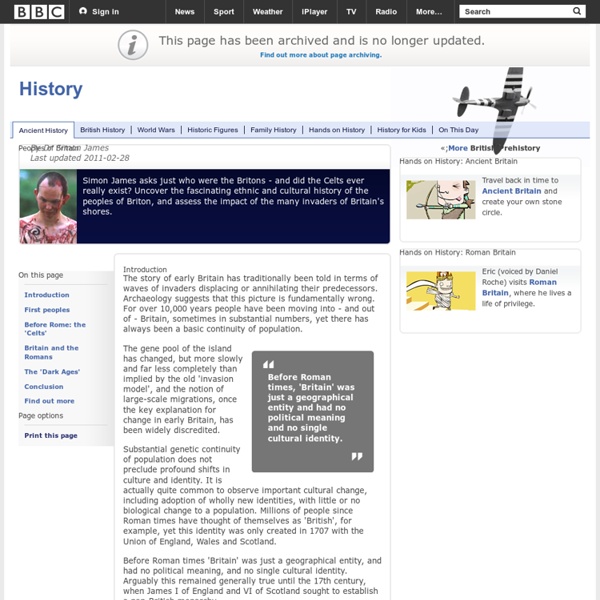



Anglo-Saxon | people Anglo-Saxon, term used historically to describe any member of the Germanic peoples who, from the 5th century ce to the time of the Norman Conquest (1066), inhabited and ruled territories that are today part of England and Wales. According to St. Bede the Venerable, the Anglo-Saxons were the descendants of three different Germanic peoples—the Angles, Saxons, and Jutes. By Bede’s account, those peoples originally migrated from northern Germany to the island of Britain in the 5th century at the invitation of Vortigern, a ruler of Britons, to help defend his kingdom against marauding invasions by the Picts and Scotti, who occupied what is now Scotland. Archaeological evidence suggests that the first migrants from the Germanic areas of mainland Europe included settlers from Frisia and antedated the Roman withdrawal from Britain about 410 ce. The peoples of each of the various Anglo-Saxon kingdoms spoke distinctive dialects, which evolved over time and together became known as Old English.
Summary Timeline 410 AD to 1066 AD - Anglo Saxon England After 400 years in Britain the Romans leave A Kingdom in Kent is formed The Kingdom of Sussex (South Saxons) The Kingdom of Wessex (West Saxons) The Kingdom of Essex (East Saxons) The Kingdom of Northumberland (Angles living north of the river Humber) The Kingdom of East Anglia (East Angles) The Kingdom of Mercia (Middle Angles) The commencement of dominant Kings, 613-731. Northumbria Kings rule over the whole of England except Kent. The Kings of Mercia rule England Saxon Kings rule all EnglandEgbert 802-839 Ethelwulf 839-858 865 England is completely over run by the “Great Army” of Danish Vikings Alfred the Great saves England King Alfred 849-899 (22 when crowned) For 100 years from 787 to 878 the Vikings attacked the Shores of England. Edward 1st 901-925 (29 when crowned) Edward, son of Alfred the Great, was determined to win back the Danish ruled land (Danelaw) north east of Watling street and with the help of his equally determined sister Ethelfleda (Lady of Mercia) did so between 921 and 924.
History - Ancient History in depth: The Anglo-Saxons Anglo-Saxon Poetry - A History of English Literature Read about A History of English Literature. More E-texts Anglo-Saxon Poetry from A History of English Literature by Robert Huntington Fletcher Preface | How to Study | Tabular View | Chapters: 1 | 2 | 3 | 4 | 5 | 6 | 7 | 8 | 9 | 10 | 11 | Assignments from Chapter I. The Anglo-Saxons doubtless brought with them from the Continent the rude beginnings of poetry, such as come first in the literature of every people and consist largely of brief magical charms and of rough 'popular ballads' (ballads of the people). Out of the popular ballads, or, chiefly, of the minstrel poetry which is partly based on them, regularly develops epic poetry. Not much Anglo-Saxon poetry of the pagan period has come down to us. The spirit of the poem is somber and grim. For the finer artistic graces, also, and the structural subtilties of a more developed literary period, we must not, of course, look in 'Beowulf.' More:Writer Directory | Book Reviews | Homework Help | E-texts | Timeline | Submit a Review |
Anglo-Saxons Germanic tribes who started to inhabit parts of Great Britain from the 5th century onwards The Anglo-Saxons were a cultural group who inhabited England in the Early Middle Ages. They traced their origins to settlers who came to Britain from mainland Europe in the 5th century. However, the ethnogenesis of the Anglo-Saxons happened within Britain, and the identity was not merely imported. The history of the Anglo-Saxons is the history of a cultural identity. Ethnonym The Old English ethnonym "Angul-Seaxan" comes from the Latin Angli-Saxones and became the name of the peoples the English monk Bede called Angli around 730[10] and the British monk Gildas called Saxones around 530.[11] Anglo-Saxon is a term that was rarely used by Anglo-Saxons themselves. Early Anglo-Saxon history (410–660) Migration (410–560) The migrations according to Bede, who wrote some 300 years after the event; there is archeological evidence that the settlers in England came from many of these mainland locations Religion
Who were the Anglo-Saxons? The Angle, Saxon, and Jute are known as the Anglo-Saxons. The Angles and the Saxon tribes were the largest of the three attacking tribes and so we often know them as Anglo-Saxons. They shared the same language but were each ruled by different strong warriors. Anglo-Saxons The Anglo-Saxons were warrior-farmers and came from north-western Europe. They began to invade Britain while the Romans were still in control. The Anglo-Saxons were tall, fair-haired men, armed with swords and spears and round shields. They loved fighting and were very fierce. Their skills included hunting, farming, textile (cloth) production and leather working. How do we know about skills and occupations of the Anglo-Saxons ? We know about the Anglo-Saxons because of things we have found giving us quite detailed information about their lives. Knives and spears are often found in Anglo-Saxon men's graves. What did the Anglo-Saxons do for entertainment (leisure)?